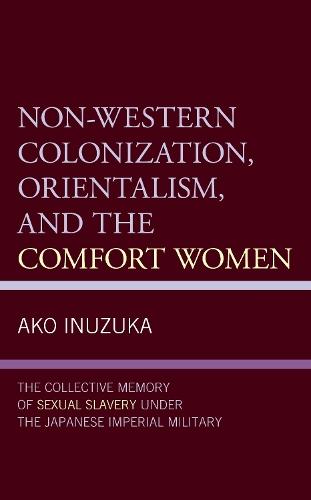Full Product Details
Author: Ako Inuzuka
Publisher: Lexington Books
Imprint: Lexington Books
Dimensions:
Width: 16.40cm
, Height: 2.50cm
, Length: 22.80cm
Weight: 0.572kg
ISBN: 9781498598378
ISBN 10: 1498598374
Pages: 258
Publication Date: 15 April 2021
Audience:
Professional and scholarly
,
Professional & Vocational
Format: Hardback
Publisher's Status: Active
Availability: Manufactured on demand

We will order this item for you from a manufactured on demand supplier.
Reviews
This beautifully written book unpacks the works of memory constructions of 'comfort women, ' a highly contentious issue in East Asia. Deeply engaged with influential popular texts in Japan over the span of past seven decades, Inuzuka illustrates how one of the harrowing atrocities that occurred during the Asian-Pacific war has been collectively remembered and forgotten in competing public discourses. This book will attract researchers in the fields of Asian studies, history, intercultural communication, and women & gender studies.--Hsin-I Cheng, Middle Tennessee State University The struggle of man against power is the struggle of memory against forgetting, so goes one of the most memorable lines in Milan Kundera's The Book of Laughter and Forgetting. In this searing, extraordinary work, Ako Inuzuka powerfully demonstrates the constitutive role of rhetoric in the construction of Japanese memories of the sexual enslavement of Korean women during World War Two. Inuzuka's book does more than make a powerful intervention in fields as varied as intellectual history, critical race studies, gender studies, and rhetorical criticism. It's courageous archaeology of her own experience invites readers into a collective practice of re-membering; that is, of knitting together a new politics of justice, solidarity, and freedom.--Omedi Ochieng, Denison University
The struggle of man against power is the struggle of memory against forgetting, so goes one of the most memorable lines in Milan Kundera's The Book of Laughter and Forgetting. In this searing, extraordinary work, Ako Inuzuka powerfully demonstrates the constitutive role of rhetoric in the construction of Japanese memories of the sexual enslavement of Korean women during World War Two. Inuzuka's book does more than make a powerful intervention in fields as varied as intellectual history, critical race studies, gender studies, and rhetorical criticism. It's courageous archaeology of her own experience invites readers into a collective practice of re-membering; that is, of knitting together a new politics of justice, solidarity, and freedom.--Omedi Ochieng, Denison University This beautifully written book unpacks the works of memory constructions of 'comfort women, ' a highly contentious issue in East Asia. Deeply engaged with influential popular texts in Japan over the span of past seven decades, Inuzuka illustrates how one of the harrowing atrocities that occurred during the Asian-Pacific war has been collectively remembered and forgotten in competing public discourses. This book will attract researchers in the fields of Asian studies, history, intercultural communication, and women & gender studies. --Hsin-I Cheng, Middle Tennessee State University
"This beautifully written book unpacks the works of memory constructions of 'comfort women, ' a highly contentious issue in East Asia. Deeply engaged with influential popular texts in Japan over the span of past seven decades, Inuzuka illustrates how one of the harrowing atrocities that occurred during the Asian-Pacific war has been collectively remembered and forgotten in competing public discourses. This book will attract researchers in the fields of Asian studies, history, intercultural communication, and women & gender studies.--Hsin-I Cheng, Middle Tennessee State University ""The struggle of man against power is the struggle of memory against forgetting,"" so goes one of the most memorable lines in Milan Kundera's The Book of Laughter and Forgetting. In this searing, extraordinary work, Ako Inuzuka powerfully demonstrates the constitutive role of rhetoric in the construction of Japanese memories of the sexual enslavement of Korean women during World War Two. Inuzuka's book does more than make a powerful intervention in fields as varied as intellectual history, critical race studies, gender studies, and rhetorical criticism. It's courageous archaeology of her own experience invites readers into a collective practice of re-membering; that is, of knitting together a new politics of justice, solidarity, and freedom.--Omedi Ochieng, Denison University"
Author Information
Ako Inuzuka is associate professor of communication at the University of Pittsburgh at Johnstown.




